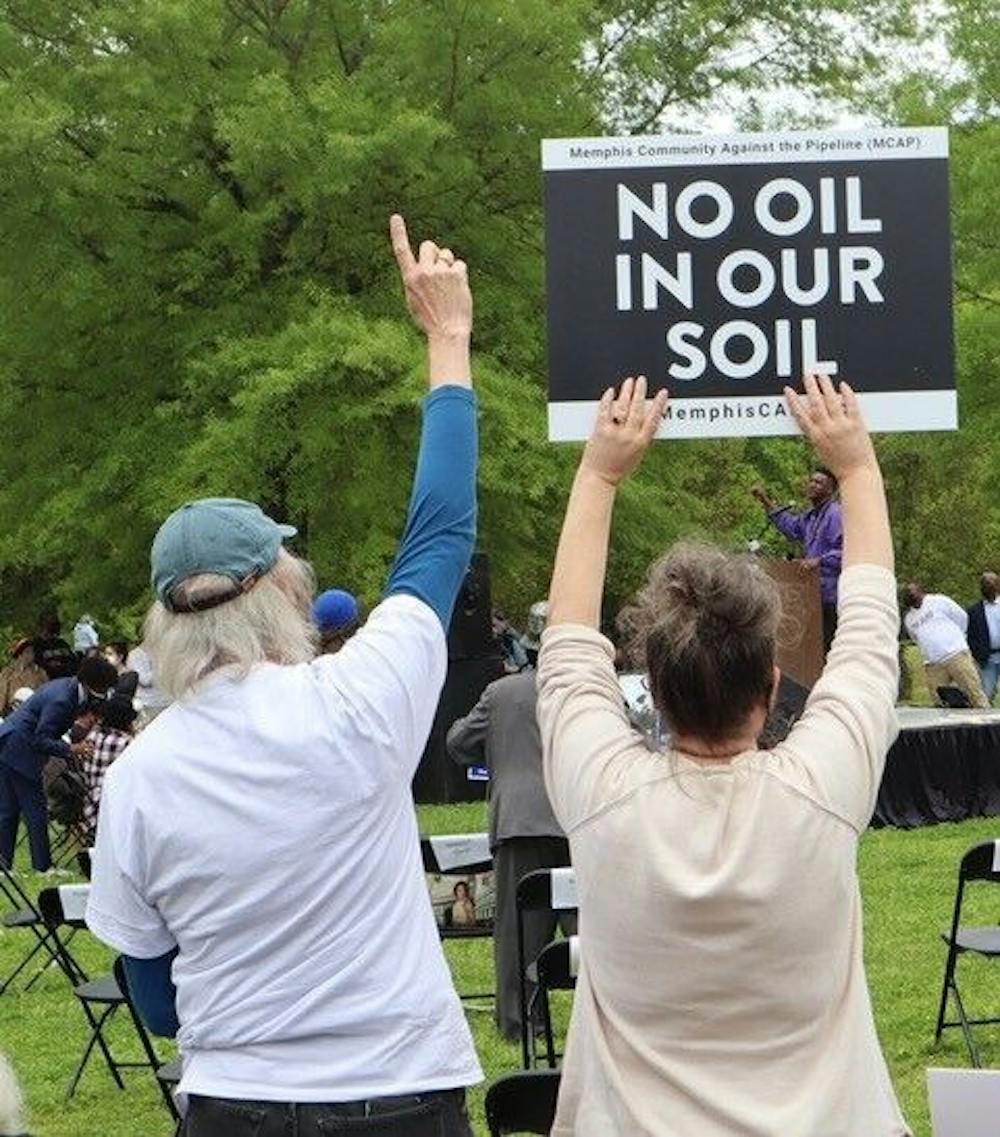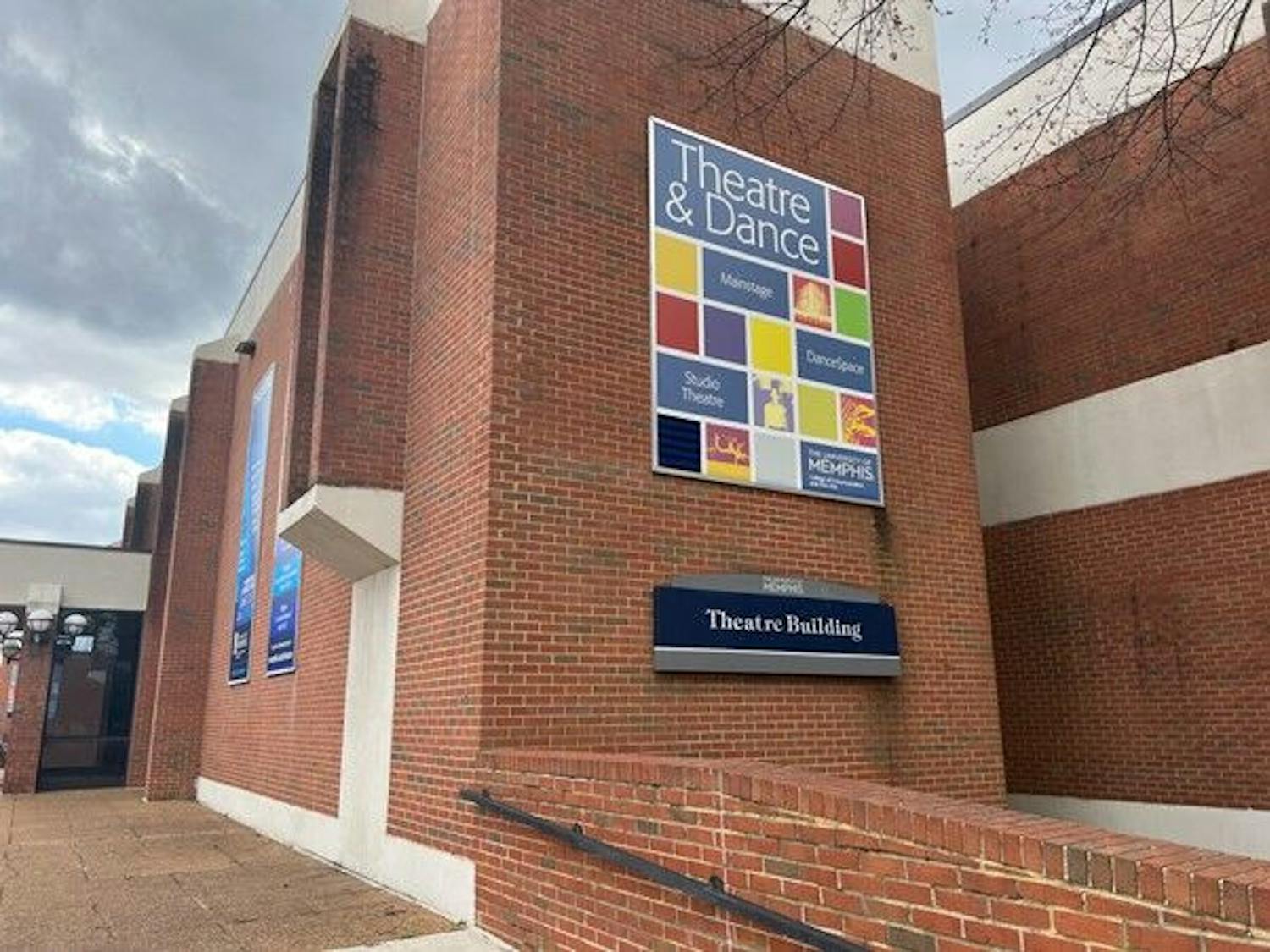A month after former Vice President Al Gore joined community leaders and activists in Alonzo Weaver Park in Southwest Memphis to decry the construction of the Byhalia Pipeline, civil rights leader Reverend Dr. William J. Barber II took to the same stage on Sunday, April 18, to send a message to representatives of the pipeline: “Not here, not now, not ever on our watch.”
The rally, which was hosted by Memphis Community Against the Pipeline (MCAP), came after months of protests and two days before what was meant to be the Memphis City Council’s vote on a third and final reading of an ordinance that would give the council sweeping authority over how the development of the pipeline is conducted, with the potential to halt construction altogether.
Barber, a civil rights icon and the former North Carolina state chapter president of the National Association for the Advancement of Colored People (NAACP), is now the co-chair of an anti-poverty campaign known as Poor People’s Campaign: A National Call for a Moral Revival.
“This is not the first time Southwest Memphis residents have been targeted,” Barber said before a crowd of over 100. “This is not the first time somebody has tried to rob you of your rights and your lives. You got to know that the residents in Southwest Memphis have been forced year after year to bear the risk of environmental pollution and industrial intrusion.”
Southwest Memphis is already home to the Valero Memphis refinery, and activists have claimed for years that the conditions in South Memphis are the result of unchecked
environmental racism. Enter the Byhalia Connection Pipeline (BCP), a proposed 49-mile crude oil pipeline that would connect between the Valero refinery in Southwest Memphis and a second Valero refinery in Byhalia, Mississippi. BCP is a joint venture of Plains All American Pipeline and Valero Energy Corp., and swift community action was taken last year when a representative from the corporations referred to South Memphis as the “path of least resistance.”
“People here are outraged and angry and hurt after hearing a representative connected to this project describe their decision,” Barber said. “They said the reason that they brought [the pipeline] through South Memphis is because it would be a path of least resistance. Well, you woke us up now.”
Other speakers included Reverend Gordon Myers, with the Poor People’s Campaign, and Justin Pearson, co-founder of MCAP. To some extent, each speaker noted the vote before city council Tuesday, which had the potential to reframe the struggle between South Memphis residents and the Fortune 500 companies behind BCP.
The following day, protests continued with a march starting at the National Civil Rights Museum – the site where Dr. Martin Luther King Jr. was assassinated in 1968. Memphians ranging in age, race and sexuality joined, including Memphis-native actress Cybill Shepherd, in the mile-long trek which ended at city hall.
“I get the sense that the troops are rallied,” said Ward Archer, the president of Protect Our Aquifer, an activist group concerned about keeping Memphis’s water supply unadulterated. “Other than Joe Biden, the troops are rallied. [Having members of congress join together] doesn’t happen often. I feel encouraged by that.”
Archer’s encouragement comes on the heels of 28 members of congress sending a letter to President Biden. In the letter, they requested the commander in chief to reevaluate the use of Nationwide Permit 12 (NWP12), which was given to Plains All American by the Army Corps of Engineers to begin construction of their project.
Although the ordinance has received unilateral support from the city council on its first two readings, Archer has concerns about residents who have already signed easements with the crude oil company.
“One thing I would like to know is, if we do win on that [ordinance],” he said, “what happens to the people that made a deal because they thought they had no choice?”
On the doorstep of city hall, Justin Pearson addressed the crowd with a message he has delivered consistently over the last few months.
“You all know where I stand on the Byhalia Pipeline,” he said. “We haven’t made it a secret — Protect Our Aquifer hasn’t, the Sierra Club hasn’t. We do not want the Byhalia Pipeline in Memphis, Tennessee, or Shelby County or Northern Mississippi. It is exploitation, it is environmental degradation and nothing good can come from it other than oil in our water and in our soil.”
The symbolic impact of marching from the National Civil Rights Museum is not lost on Pearson. Leading a group from the location of one of Memphis’ darkest moments to the center of the local government has fundamentally enhanced the importance of the movement he, Kizzy Jones and Kathy Robinson started months ago, he said.
“[Marching from the Lorraine] is deeply meaningful,” he said. “We remember what brought Dr. King here, and it was folks fighting, one way or another, for justice: thousands of Memphians getting together to say, ‘Enough is enough and now is the moment.’ What’s important to realize is that spirit doesn’t die, that energy can’t be destroyed. We go to the Lorraine Motel not to mourn, but to realize that it was there that the most profound leader of the 20th and 21st century came to Memphis. Now we, in Memphis, are reviving that spirit and movement power in order to create justice.”
The city council was set to vote on the ordinance Tuesday, but has postponed it until they reconvene on May 4. In that time, they will iron out questions and issues posed by council members, Plains All American and Valero.
Both companies said in the meeting Tuesday that, if the ordinance passes its third reading, they will pursue litigation. Robert Spence, a former city attorney who is representing Plains All American, claimed the local government does not have the power to contradict federal and state permits.
“One of the major problems with the ordinance, when looked upon through the lens of a lawyer, completely ignores the concept of federalism,” he said. “In this particular instance, federal law and state approvals are the chief determinants. The ordinance being proposed ignores this basic tenant of government.”
A rally was held by Memphis Community Against the Pipeline and the Poor People's Campaign. Reverend Dr. William Barber II voiced his disdain for the pipeline and called for those who received donations from Plains All American to publicly return them.
Memphis Communtiy Against the Pipeline, along with community members, marched from the National Civil Rights Museum Monday. Ending on the plaza in front of city hall, Justin Pearson continued to voice his disproval of the pipeline.






